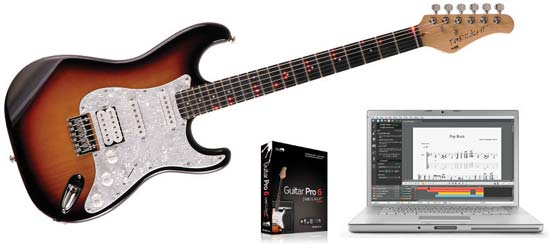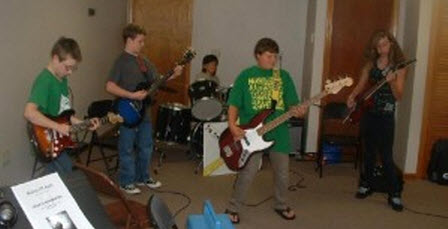If you've read any articles online on how to teach children guitar, you will notice a common theme in the advice given: fun.
Want to teach children guitar? Make lessons fun. Have trouble with your student? Fun is the answer. How do I teach children guitar? Fun.
On the surface it makes sense that children need to have fun during lessons. If they do not enjoy the lesson they will zone out, won't practice and can become a problem. But unfortunately this advice isn't very useful to a guitar teacher starting to teach kids. In this post you will find out why 'fun' isn't the real answer and you will learn what it means to give effective guitar lessons to children.
Why Fun isn't the answer
What's the difference between a guitar lesson and a game of Guitar Hero or Rockband?
Obviously the difference is one teaches the child a real instrument and the other is a toy guitar. A child can sure have a lot of fun playing along to songs in Guitar Hero - but a game of Guitar Hero won't teach them the real thing. That's the entire point of Guitar Hero, to have fun. The problem with structuring your lessons around 'fun' is that you can easily lose sight on what's really important. A child can 'practice' Guitar Hero for a long time, have a lot of fun, but will never accomplish anything. The same thing can happen in your lessons when fun is the main goal or focus.
Let's think about this a different way: how do you think a parent would react after paying for a couple years of guitar lessons only to find out their child hasn't actually learned anything substantial? Do you think the parent will be happy knowing their child had fun in each lesson but never accomplished anything?
That's the problem with the common wisdom of 'making sure your lessons are fun'. It sets the wrong goal for you as a guitar teacher. Fun is an important aspect of lessons with a child as you will read later, but understand that focusing on fun can distract you from running an effective lesson.
So how about we set a more appropriate goal for lessons: to learn.
It may seem obvious that the goal of guitar lessons is to learn, but it's an important reminder. Now that we have an appropriate goal, let's look at how to teach children guitar so they actually learn.
A child's needs in a guitar lesson
If you properly understand a child's needs during a lesson, you will be able to tailor the lesson to their needs effectively. 'Fun' is the common solution people think up because it feels like it fits the student's needs. Understanding needs is explained in full in our teaching guide TPS-01. It's worth reading as it will help you correctly identify your students needs.
Quite simple, if you misunderstand a child's needs during a lesson, problems arise. For example if the child needs to go to the toilet and they do not tell you, you might mistake the squirming in their seat as impatience or boredom. Trying to make the lesson more fun definitely won't help a child needing to use the bathroom. As another example, if your student doesn't like the song you're currently teaching them, the usual reaction is that they won't put much effort in and will become bored. A teacher's usual reaction to this is to try and encourage the student, but no amount of encouragement can persuade a child who really doesn't like the song.
The point to take away here is that understanding the child's needs during a lesson can play a big part in the success of the lesson. Learn to identify a child's needs and come up with solutions specific to those needs.
Giving a successful guitar lesson to a child
So far we've explained that the main goal of a guitar lesson is to learn and that lessons shouldn't be focused around fun as a goal. On top of this we've looked at why it's important to learn to identify a child's needs during a lesson so you can meet those needs. Now let's look at how to take this further and give your student an excellent lesson.
In the guide TTQ-04, three general rules are presented to give an effective guitar lesson to a child. They are:
1. Being able to see progress
2. Being rewarded for their progress
3. Being constantly challenged in a positive way
These are the keys to a successful guitar lesson with a child. If you can constantly achieve these three goals, your student will walk out smiling every time. The guide TTQ-04 explains each point in detail so let's just have a brief overview on why each point is important.
Progress: a child needs to see their own progress in the same way they want to 'level up' or win when playing games. Without a sense of improvement or achievement, the lesson will feel hollow to the child - it will feel like a chore. Your student won't know they're improving unless you constantly remind them so be sure to focus on letting them know any time they make progress. For example, in our printable resource KID-01 a simple progress chart allows the student to clearly see their own progress. Such a simple tool can change the way a child views guitar lessons.
Rewards: any hard work your student puts into the lesson should be rewarded as it reinforces positive behavior. Likewise, whenever the child improves, they should be rewarded. While this could mean actual prizes, even a simple 'well done!' can be enough of a reward. If the child is rewarded throughout the lessons, they will continue to work towards other potential rewards. For example, in our KDS series of lesson plans, a simple reward is built into the lesson plan - the student can color in a relevant picture when they successfully complete the lesson. A very simple reward, but suitable to the task.
Challenges: if a song or task is too easy, the student will get bored (no matter how fun you try and make it). If the task is too hard, the student will become frustrated. The key is to set tasks that challenge the child, but only challenging enough to give them a bit of a push. The tasks need to be achievable. A child will enjoy working hard for an achievable task - especially if they can see their progress (1) and know they will be rewarded for their work (2).
When you view guitar lessons for children with these three rules in mind, it becomes clear what you need to do to give an effective lesson. As soon as one of the three points above aren't being met, you will experience problems. So constantly checking that these three points are being met is the key to success.
One more word on Fun
While you shouldn't focus your lesson around fun as a goal, it's still important that your student enjoys the lessons. You can still make the lessons fun through your enthusiasm and attitude. If you set an appropriate task for your student, your enthusiasm will enhance the lesson. So while we've been very clear in this article that fun isn't the answer - it's important to remember that it is part of the solution. Don't set tasks because you think it will be fun, instead set appropriate tasks and be enthusiastic while teaching.
Your enthusiasm and attitude can dramatically enhance the quality of your lessons with children, but only when the three points above are met. Keep this in mind whenever it feels like things aren't going well in a lesson. The solution is to find out which of the three points aren't being met or whether there's a different need not being met.
This post has given you a general overview of giving effective guitar lessons to a child. The resources and guides mentioned go into more detail and will help you work out any specific actions you might need to take. If you need further help in teaching children guitar, contact us here and we'll provide you with support. Teaching children guitar is challenging, but at the same time it can be very rewarding when done right.





